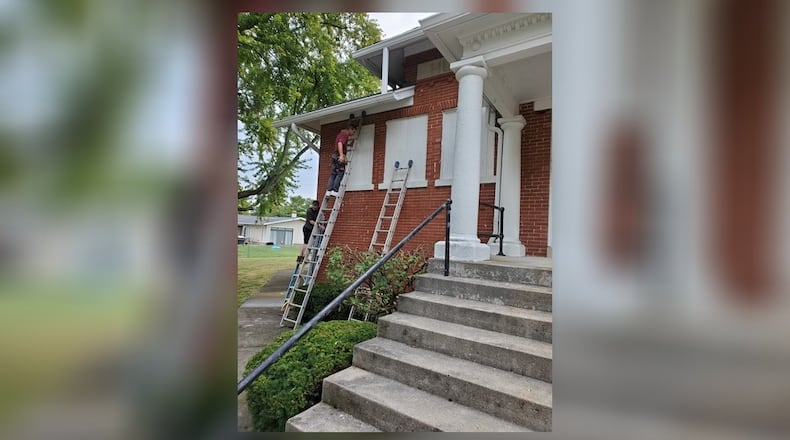“With these improvements we’re turning a corner ... We’re not just a repository of historical artifacts, but a place where people can learn about our history,” said Executive Director Cheryl Ogden. “We are outgrowing our space, and redoing the inside of the museum will allow us to display more artifacts and tell a more thorough story of Champaign County.”
Entry doors and windows are being restored on the north end of the building, which will enhance the outside of the museum, and are expected to be reinstalled before the end of this month.
Many improvements will be made inside the museum, including the first floor collection galleries and second floor work, research and meeting space.
New display cases will begin arriving in mid-November that are designed to exhibit at least 50% more artifacts than the current cases, in the same amount of floor space, and provide visitors a better view of the collections, Ogden said. The galleries will also be repainted and get new carpet.
Earlier this year, the museum’s research and volunteer work area was moved from the first floor by the entrance to the second floor to provide more exhibit space on the first floor. The upstairs will also include electrical work to accommodate new computers and workstations, as well as a new copier and printer to create new interpretive exhibit signs.
Other changes to the layout of the first floor will include:
- A new reception desk at the entrance, with a gift shop.
- The Woodstock Post Office exhibit will be moved to the front of the museum, by the gift shop.
- The agricultural history section, now in the addition on the east side of the museum opposite the entrance, will be moved to the area now occupied by the post office.
- The current agricultural space will be developed into a “small town” scape that will bring together a variety of existing exhibits related to small-town life, such as the bankers window, tin smith shop, grocery store, switchboard, theater seating, jewelry repair shop, an antique car, a display of railroads in the county, and horse buggies displayed in front of historical photo murals of Mechanicsburg, St. Paris and Urbana, where the buggies were manufactured.
The Champaign County Historical Society received money after applying for a cultural grant from the OFCC, which funds grants for planning, construction, renovation and expansion projects at theaters, museums, arts education facilities, historical sites and publicly-owned professional sports venues.
“We are thrilled to receive the OFCC grant and we are eager to reach a larger, more diverse audience when the renovation is complete in about 16 months,” Ogden said.
Board of trustees President Terry Koster said these improvements are made possible by individuals, families and businesses who have supported the museum’s capital improvement campaign, the OFCC, and the Champaign County Board of Commissioners.
Originally established in 1934, the museum first housed its collection at the former location of the Champaign County Library on West Market Street, then moved to the Nutwood Barn on North Main Street. It’s been located at 809 East Lawn Ave. in Urbana since 1972.
The Historical Society is open to the public 10 a.m. to 4 p.m. Tuesday through Friday and 10 a.m. to 2 p.m. Saturday.
About the Author


